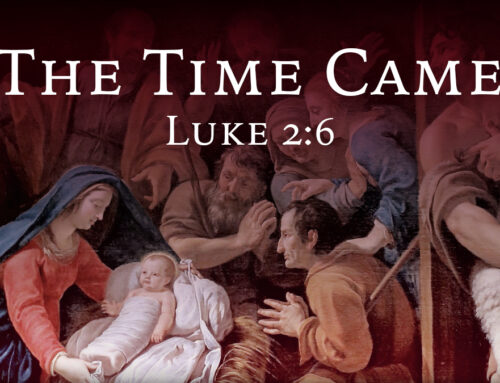Watch any little kid with a balloon. They hold onto that balloon for dear life. That’s because they know that the moment they let go, their balloon will be lost forever. But sooner or later, whether the child is distracted or just loses interest, they loosen their grip. And off the balloon goes… never to return. Sure enough, big tears swell up in the child’s eyes as the balloon floats helplessly beyond their little hands.
When we hear the story of the Ascension, I think we can get the idea that Jesus is like that balloon. He floats away from us, and we lose him. We assume that the apostles must have been grief-stricken and helpless as they watched him lift up and gently sail off into the blue beyond their reach… The man who had just shared breakfast with them was now unseen, and for all the world knew… vanished.
I’ll be honest, the Ascension of Jesus has to be one of the most confusing mysteries of our Christian faith. As a Church, we confess the Ascension every Sunday in the Creed — “He ascended into Heaven, and is seated at the right hand of the Father.” And yet, we still can’t seem to fathom why Jesus would leave us like that…it looks and feels like we’ve been left alone. We hear that after Jesus was raised from the dead by the Spirit, that he spent 40 whole days with his disciples — eating with them, spending time with them, teaching them about the Kingdom of God. We hear that and wonder — why couldn’t he have stayed longer? Why did he leave us on our own? Just like with that lost balloon, we can feel sad and somehow cheated that Jesus has slipped through our grasp.
But I ask you as one who wrestles with this as well — Who are we to impose terms on the Lord like this? Do we really think we have Jesus so firmly in our grasp? That we have a handle on him, like that little kid with their balloon?
No, the realty is this — that in the Ascension, Jesus takes hold of us. And only by letting Him go and allowing Him to work with us from Heaven can we actually experience His power revealing itself through our actions, our prayer, our thoughts. Only in embracing His Ascension to the right hand of God, can we be sent out on mission for His Church — to transform hearts and bring the Risen God to those who need Him the most. No, we cannot cling to Jesus as if He was a child’s balloon. In John’s gospel, this idea is illustrated in a beautiful exchange between Jesus and Mary Magdalene on Easter Morning. Mary finally recognizes Jesus and falls at his feet in worship, but he responds in a curious way: “Stop holding onto me, for I have not yet ascended to the Father.”
He’s God. He’s unpredictable and changeless. He is perfect and all holy. And He loves us recklessly.
What does this reveal to us other than the fact that we don’t have a handle on the Lord. Instead, He has a handle on us. We can’t cling. And yet He wraps Himself around us. Our life in God — our life of faith — only makes sense when we let go of our deathgrip on Him and allow Him to work on His terms. When we let Him be God. When we allow Him to be Lord of the heavens and the earth. This is possible only if we let Him go to be with His Father and Our Father.
But the unbelievable thing is this: The apostles didn’t sulk. They didn’t worry. Big tears didn’t swell up in their eyes. Instead, we’re told that they “went forth and preached everywhere.” How can this be? Where did they get the motivation?
Jesus spent those 40 days before his Ascension encouraging them and preparing them for their upcoming task.
Isn’t it the case that we’re more like the balloon than Jesus? Aren’t we prone to “drift away” from the Lord? To trail off into the immensity of the skies, never to return?
I’m always kind of frustrated when I hear Christians use the phrase “In Jesus’ time” — as if to lock Jesus into some far distant historical footnote. As if we have closed up the Lord’s tomb again and have forgotten he didn’t stay in there. But He’s alive. The Ascension of our Lord into Heaven reminds us that the definitive time for Jesus is now. In fact, it’s always been Jesus’ time, and it always will be. He has not abandoned His Church. He hasn’t floated away never to be seen again, leaving us to figure this religion thing out on our own. He came at a specific time in Israel’s history, but His time certainly hasn’t ended, in fact he is present in the way only God could be present to us — in our hearts, in our experiences, in the people we meet everyday. He is everywhere alive. Pope Benedict XVI says it beautifully: “First and foremost, the disciples bore witness to the fact that He is alive now, that he is Life itself, in whom we too come alive.”
Over the past few weeks of the Easter Season, we’ve been reading amazing stories from the Acts of the Apostles — stories that reveal that Jesus does not idly sit at the right hand of the Father. Through the working of the Holy Spirit, He is still actively pursuing the Father’s will through the life of the Church. We can understand the Ascension, therefore, as enabling Jesus to be present in a deep and abiding way, even if it is hidden. We experience this most of all in the breaking of the bread — where Jesus is visible, and yet hidden. He is fully and truly present with us and for us, and yet under the appearance of bread and wine. In the Eucharist, let us remember that Jesus is interceding for us. It is Christ who accomplishes the celebration of the Mass. He has passed over into Heaven, and has ascended. He didn’t leave us. He isn’t gone. He’s here. And he’s just as alive as ever.





Leave A Comment